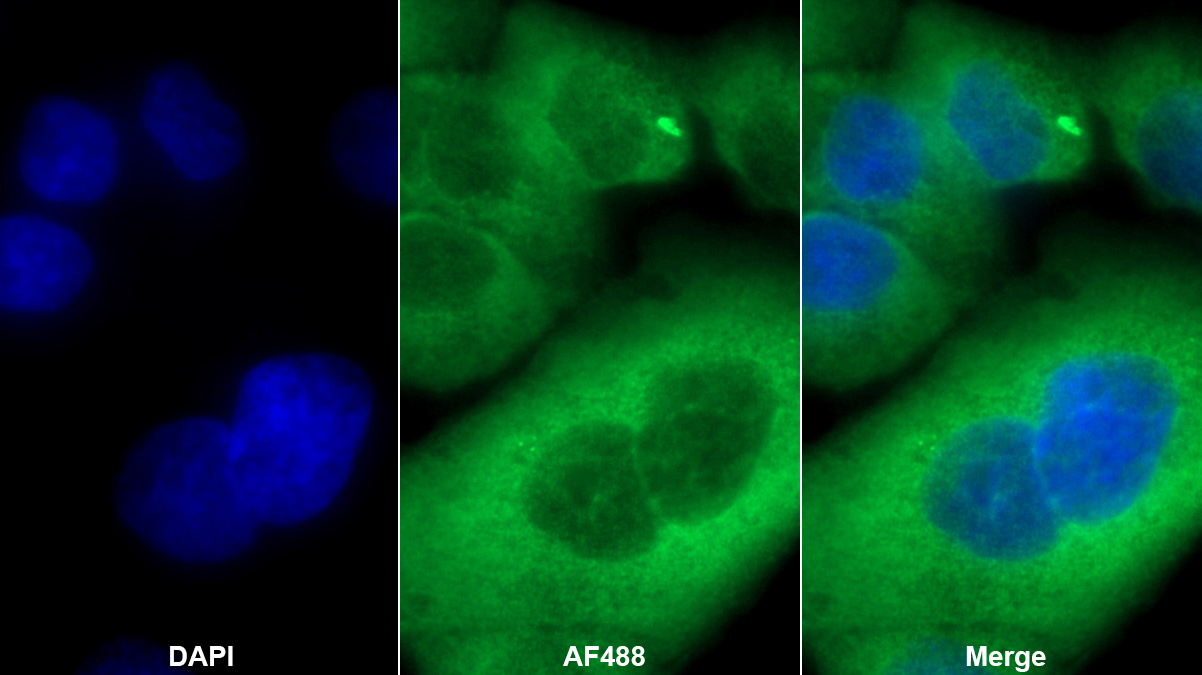Polyclonal Antibody to Mitochondrial Open Reading Frame Of The 12S rRNA-c (MOTS-c) 

Overview
Properties
- Product No.PAX132Hu01
- Organism SpeciesHomo sapiens (Human) Same name, Different species.
- ApplicationsICC/IF
If the antibody is used in flow cytometry, please check FCM antibodies.
Research use only - DownloadInstruction Manual
- CategoryDevelopmental science
- SourcePolyclonal antibody preparation, Host Rabbit
- Ig Type IgG, Potency n/a
- PurificationAntigen-specific affinity chromatography followed by Protein A affinity chromatography
- LabelNone
- Immunogen CPX132Hu21-OVA Conjugated Mitochondrial Open Reading Frame Of The 12S rRNA-c (MOTS-c)
- Buffer Formulation0.01M PBS, pH7.4, containing 0.05% Proclin-300, 50% glycerol.
- TraitsLiquid, Concentration 0.5mg/mL
Sign into your account
Share a new citation as an author
Upload your experimental result
Review

Contact us
Please fill in the blank.
Specifity
The antibody is a rabbit polyclonal antibody raised against MOTS-c. It has been selected for its ability to recognize MOTS-c in immunohistochemical staining and western blotting.
Usage
Immunofluorescence: 5-20µg/mL;
Optimal working dilutions must be determined by end user.
Storage
Store at 4°C for frequent use. Stored at -20°C in a manual defrost freezer for two year without detectable loss of activity. Avoid repeated freeze-thaw cycles.
Stability
The thermal stability is described by the loss rate. The loss rate was determined by accelerated thermal degradation test, that is, incubate the protein at 37°C for 48h, and no obvious degradation and precipitation were observed. The loss rate is less than 5% within the expiration date under appropriate storage condition.
Giveaways
Increment services
-
 Antibody Labeling Customized Service
Antibody Labeling Customized Service
-
 Protein A/G Purification Column
Protein A/G Purification Column
-
 Staining Solution for Cells and Tissue
Staining Solution for Cells and Tissue
-
 Positive Control for Antibody
Positive Control for Antibody
-
 Tissue/Sections Customized Service
Tissue/Sections Customized Service
-
 Phosphorylated Antibody Customized Service
Phosphorylated Antibody Customized Service
-
 Western Blot (WB) Experiment Service
Western Blot (WB) Experiment Service
-
 Immunohistochemistry (IHC) Experiment Service
Immunohistochemistry (IHC) Experiment Service
-
 Immunocytochemistry (ICC) Experiment Service
Immunocytochemistry (ICC) Experiment Service
-
 Flow Cytometry (FCM) Experiment Service
Flow Cytometry (FCM) Experiment Service
-
 Immunoprecipitation (IP) Experiment Service
Immunoprecipitation (IP) Experiment Service
-
 Immunofluorescence (IF) Experiment Service
Immunofluorescence (IF) Experiment Service
-
 Buffer
Buffer
-
 DAB Chromogen Kit
DAB Chromogen Kit
-
 SABC Kit
SABC Kit
-
 Long-arm Biotin Labeling Kit
Long-arm Biotin Labeling Kit
-
 Real Time PCR Experimental Service
Real Time PCR Experimental Service
Citations
- Circulating MOTS‐c levels are decreased in obese male children and adolescents and associated with insulin resistancePubmed:29691953
- Development of a mass spectrometry‐based detection method for the mitochondrion‐derived peptide MOTS‐c in plasma samples for doping control purposesPubmed: 30394592
- Adiponectin treatment improves insulin resistance in mice by regulating the expression of the mitochondrial-derived peptide MOTS-c and its response to exercise via …Pubmed: 32880686
- Induction of hyperandrogenism and insulin resistance differentially modulates ferroptosis in uterine and placental tissues of pregnant rats
- Neural cell©\derived plasma exosome protein abnormalities implicate mitochondrial impairment in first episodes of psychosis33454965
- MOTS-c interacts synergistically with exercise intervention to regulate PGC-1¦Á expression, attenuate insulin resistance and enhance glucose metabolism in mice via?¡33722744
- Evolution of Mitochondrial-Derived Peptides, Humanin and MOTSc and Changes in Insulin Sensitivity During Early Gestation
- Abnormal levels of mitochondrial proteins in plasma neuronal extracellular vesicles in major depressive disorder34471251
- The Mitochondrial-Derived Peptide MOTS-c Relieves Hyperglycemia and Insulin Resistance in Gestational Diabetes Mellitus34798268
- SARS‐CoV‐2 and mitochondrial proteins in neural‐derived exosomes of COVID‐19Pubmed:35285072
- Evolution of Mitochondrially Derived Peptides Humanin and MOTSc, and Changes in Insulin Sensitivity during Early Gestation in Women with and without Gestational …Pubmed:35683389






